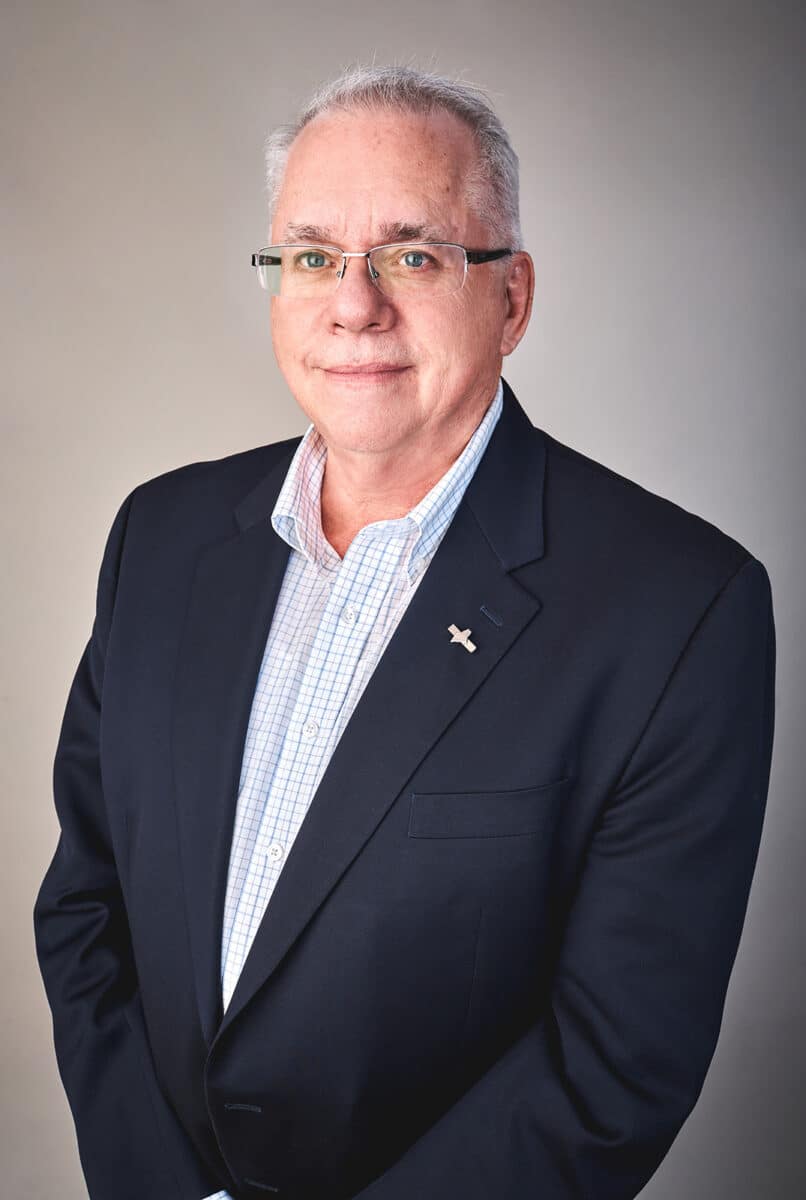 GC81 was deputy John Hennessy’s second General Convention and first as elected chair of the Maine deputation. A public policy consultant for the diocese with long experience in advocacy at the state and federal level, Hennessy served as co-chair of the convention’s LGBTQ+ caucus and on the Committee on Social Justice and U.S. Policy. He says that while being present for the election of a new presiding bishop was exciting, his interest at GC81 was more on the legislative side—work that began in the late winter with meetings of the Social Justice and U.S. Policy Committee on Zoom. “It was fascinating to hear people from around the church share their opinions about policies—like gun policy, for example—things that we’ve been working on in this diocese for years and understanding that they share the same focus on the issue,” he says. “Then we got to meet in person in Louisville, and that just exceeded my expectations, the way that we modeled how to disagree without being disagreeable, and it was lovely. It was the church at work.”
GC81 was deputy John Hennessy’s second General Convention and first as elected chair of the Maine deputation. A public policy consultant for the diocese with long experience in advocacy at the state and federal level, Hennessy served as co-chair of the convention’s LGBTQ+ caucus and on the Committee on Social Justice and U.S. Policy. He says that while being present for the election of a new presiding bishop was exciting, his interest at GC81 was more on the legislative side—work that began in the late winter with meetings of the Social Justice and U.S. Policy Committee on Zoom. “It was fascinating to hear people from around the church share their opinions about policies—like gun policy, for example—things that we’ve been working on in this diocese for years and understanding that they share the same focus on the issue,” he says. “Then we got to meet in person in Louisville, and that just exceeded my expectations, the way that we modeled how to disagree without being disagreeable, and it was lovely. It was the church at work.”
The House of Deputies passed four resolutions on different components of gun safety (A166, B004, D011, and D014) put forward by the committee. But because the resolutions were placed on the consent calendar, there was no opportunity for deputies to debate or discuss them, which was disappointing for Hennessy. “In 2015 in Salt Lake City, the Committee on Social Justice and U.S. Policy passed the most comprehensive resolution on guns; in my opinion, you couldn’t have written it any better today, which says something about how focused people were nine years ago,” he says. “But it’s also sad that we’re still having the same conversations without any progress.” Two of the four resolutions (A166 – Registration of Firearms; Licensing of Firearm Sellers, Buyers, and Users; Use of Taggants, and D011 – The Prohibition of Assault Weapons) reaffirmed decisions made at previous conventions. “That’s important,” Hennessy says. “I get it, and it brings the issue back on people’s radar screens, but it wasn’t groundbreaking because they did that already.”
While he has been particularly active in promoting gun safety legislation in Maine, Hennessy believes that the work of the Racial Truth Telling, Reckoning & Healing Committee—which passed resolutions on Indigenous Liturgy (A095), Becoming Beloved Community (D016), Reparations (A015) and establishing model policies for anti-racism and reconciliation work (A035)—will have a greater impact on the diocese. “I know through my work with Sacred Ground all over the church that predominantly white dioceses like Maine have been struggling with racial reconciliation and Becoming Beloved Community,” he says. “Sure, we can go through 10 or 11 sessions of Sacred Ground, but what’s next? I think this convention and this committee gave us those guidelines. I’ve witnessed us trying to recreate the wheel and we don’t need to do that. Someone has done it for us. What we need to do is interpret what they’ve done, because what works in Alabama is not necessarily going to work for Maine. Some of what we’ve had before has been very abstract, and I’m excited about having some more direction that we can work with.”
But it was not legislation that provided Hennessy with the most meaningful moment in Louisville; it was the passage of C009 – Petition of the Episcopal Church in Navajoland to become a Missionary Diocese. “Seeing the people from that area of the country come as such devout Episcopalians and such believers and lovers of Jesus Christ as Indigenous people is something I’ve not experienced,” says Hennessy, whose work includes advocating for tribal sovereignty through the Episcopal Maine Public Policy Network (MEPPN). “The happiness on their faces when they were brought up to the dais to present this resolution—I can’t even tell you how overcome with joy it felt to be in the room when that happened. I’d like to think if somebody asked me what was most significant about this convention 10 years from now, I’d say the same thing because it was so moving.”
Back in Maine, Hennessy is reviewing the language of the public policy resolutions passed at convention to determine their impact on the future work of the MEPPN. He loves to speak about faith-based advocacy and the justice work of the diocese at churches in Maine. Reach out to invite him via email or phone 207.400.6619 (mobile).